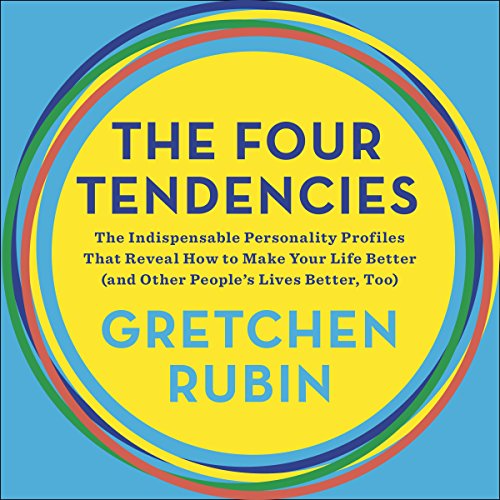I recently went through the book “The Four Tendencies” by Gretchen Rubin and found it to be a fascinating look at an aspect of human behavior. I encourage you to give it a read.
Below you will find my notes (gathered in Obsidian) to give you an overview.
If you’re familiar with it, what type are you? I personally fit clearly in the “questioner” box.
The Four Tendencies
The indispensable personality profiles that reveal how to make your life better (and other people’s lives better, too)
Initial Notes:
The four types: Upholder, Obliger, Rebel, Questioner
Summary:
The key to happiness is to understand your own strengths and weaknesses, collectively known as your Tendency. Once you can recognize these aspects of yourself, you can start to adjust to and compensate for them. No one is perfect, and we can make life much easier on ourselves by avoiding pitfalls and playing to our strengths.
Upholder
- Meets outer expectations, meets inner expectations.
- Overall:
- They want you to tell them what needs to be done; they value self-reliance and performance.
- Reliable people who take care of themselves, but they do face challenges.
- They should receive clear instructions, and their frustrations are best met with understanding.
- Good:
- Reliable for others and themselves.
- Doctors and managers love them.
- Bad:
- Can blindly follow rules, or get overly controlled by a new habit.
- Have trouble delegating duties.
- Their Question: “Should I do this?”
- Influence them: They want to know what should be done.
- Values: Self-command and performance.
- Fictional People:
- Amy Santiago from Brooklyn 99
- Leslie Knope from Parks & Rec
- Hermione from Harry Potter
- Dwight Schrute from The Office
- Lisa Simpson from The Simpsons
- Monica Geller from Friends
- Other quotes from book:
- “In fact, the Upholder commitment to meeting expectations can sometimes make Upholders seem…cold. There’s a relentless quality to Upholders. They’re going to do what must be done even, sometimes, if that means inconveniencing other people or being out of step.”
Obliger
- Meets outer expectations, resists inner expectations.
- Overall:
- They want you to hold them accountable for what needs to be done; they value teamwork and duty.
- Struggle to meet their own expectations, but this can be solved by manufacturing outside accountability.
- May be the toughest category to be in, so they may get the most out of understanding the Four Tendancies.
- Good:
- Quite effective at meeting the demands of others; they are the dependable rocks of society.
- Bad:
- Will struggle to exercise, take an online course or doing much of anything that requires self-motivation.
- Their Question: “Does this matter to anyone else?”
- Influence them: They need accountability.
- Values: Teamwork and duty.
- Fictional People:
- Andy Dwyer from Parks & Rec
- Harry Potter
- Pam Halpert from The Office
- Katniss Everdeen from The Hunger Games
- Chandler Bing from Friends
- Other quotes from book:
- “Remind the Obliger that saying no allows him or her to say yes to work that’s more important”
Rebel
- Resists outer expectations, resists inner expectations.
- Overall:
- They want you to let them decide what needs to be done; they value freedom and individuality.
- They resist meeting any expectations or being bossed around.
- They can frustrate themselves, but there are ways they can meet their own expectations.
- Good:
- They’re willing to work hard, if things are framed in a way that makes them feel like they are the ones making the decision.
- Bad:
- Anything that sounds like an expectation gets rejected.
- Their Question: “Is this the person I want to be?”
- Influence them: They want freedom to do something their own way.
- Values: Freedom and self-identity.
- Fictional People:
- April Ludgate from Parks & Rec
- Sirius Black from Harry Potter
- Creed Bratton from The Office
- Bart Simpson from The Simpsons
- Other quotes from book:
- “One parent of a Rebel explained, “The best way to wrangle the Rebel child is to give the kid the information to make a decision, present the issue as a question that he alone can answer, and let him make a decision and act without telling you. Let him make a decision without an audience. Audiences = expectations. If he thinks you’re not watching, he won’t need to rebel against your expectations.”
- “As one Questioner pointed out, ‘The Rebels’ best asset is their voice of dissent. We shouldn’t try to school it out of them, or to corporate-culture it out, or shame it out. It’s there to protect us all.”
- “Rebels can do anything they want to do”
- “The harder the push, the greater the Rebel push-back. I laughed when a Rebel friend told me, ‘No one can tell me to do anything. I recently got an email saying “Please read” in the subject line, and I immediately deleted it.”
- “Rebels often seek out careers that give them the flexibility to choose their work, set their own schedules, and avoid having to answer to other people.”
- “For Rebels, the ability to choose is so important that sometimes they make a choice—even when it’s against their own self-interest or it’s not what they prefer—just to reassure themselves that they can make that choice.”
Questioner
- Resists outer expectations, meets inner expectations.
- Overall:
- They want you to justify what needs to be done; they value justification and purpose.
- Resistant to meeting the needs of others, and their nature can be both a benefit and a hinderance.
- They need clear justification, they don’t like being questioned and should avoid certain complicated jobs.
- Good:
- Great at spotting the ways in which a procedure can be improved.
- Bad:
- Feel a strong desire to question everything.
- Can face analysis paralasis when making decisions.
- If you want your Questioner partner to buy bread on the way home, don’t just send a text that says, “Pls pick up bread, thx!” While it might take some extra effort on your part, you’ll be preventing a lot of hassle by being exact and asking him to pick up crusty sourdough bread because your mom is coming over tonight and it’s her favorite, and also because it will go perfectly with the soup you’re making. With this justification, you’ll be sure to avoid any follow-up questions.
- Their Question: “Does this make sense?”
- Influence them: They want justification.
- Values: Justification and purpose.
- Fictional People:
- Ron Swanson from Parks & Rec
- Fred and George Wesley from Harry Potter
- Jane Eyre
- Other quotes from book:
- “Questioners … can add tremendous value to relationships and organizations by ensuring that they-and the people around them- don’t unthinkingly accept expectations that aren’t well justified”
- “Questioners are often puzzled by others’ willingness to act without sound reasons.”
- “when encouraging Questioners to take action, it can be useful to remind them, “Just try it. It’s an experiment.”
Other notes
“Whatever tendency you may be, knowing more about yourself can help you succeed in work and life.”
“The happiest, healthiest, most productive people aren’t those from a particular Tendency, but rather they’re the people who have figured out how to harness the strengths of their Tendency, counteract the weaknesses, and build the lives that work for them.”
“One of my Secrets of Adulthood is that we’re more like other people than we suppose and less like other people than we suppose.”
I encourage you to read the full book to learn more, and leave your type in the comments below!




